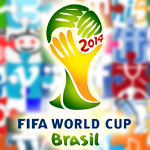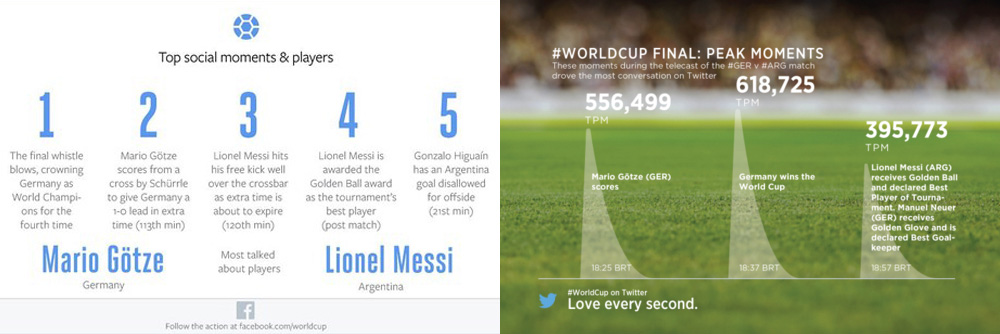
According to FIFA, the Soccer World Cup is the most viewed sport event on the planet - a bold statement yet true to every bits of details. As the world opens its eyes to the World Cup 2014 in Brazil, the world is focusing on something more than the matches. Soccer may not be the most popular sport in many countries, but social media is making the FIFA World Cup a blooming experience to everyone.
There has been a rapid acceleration of social media usage as well as mainstream adoption of smartphones and tablets since the last FIFA World Cup. Even before it started, the 2014 World Cup was predicted to be the most social sporting event ever, according to projections from the Adobe Digital Index (ADI), a study of online marketing.
A moment before its kick-off on June 12, the World Cup had generated more than 19 million social mentions with 90 percent of the world contributing to these conversations. Those stats from ADI were collected from social channels including blogs, Facebook, Google+, Reddit, Twitter, Dailymotion, Flickr, Instagram, Tumblr, Foursquare and Youtube. More than 69 million social mentions have been included in the sample from 230 countries and territories talking about the World Cup.
The phenomenon has made the month-long soccer championship outpace the Sochi Olympics and 2014 Super Bowl, even before it started.
Famous soccer athletes, such as Portugal's Cristiano Ronaldo, are getting millions of mentions. This might be a staggering number. But with his fan base on Twitter reaching 117.4 million user at the moment of kick-off (roughly twelve times the population of his homeland), Ronaldo that scored eight goals in the World Cup 2014 qualifying campaign, can expect for more.
Social Media, Preparing for the Anticipation
Capable of attracting more spectators, social media networks are tweaking their functions and gearing up with new features. Offering their users unique customized access to the information they want to keep track off. Two of the most notable social media that currently active in delivering real-time information from its large user base are Facebook and Twitter.
Facebook, the social media giant, launched two different sections. The first one is the Trending World Cup. Which allow users to check on the latest info, including goals, matches and comments related to the subject made by their own friends. This tool appears at the top of the news feed when the user searches for "FIFA World Cup" or "Trending World Cup". They also offer a game calendar on the right-hand side of the page with date, time and a countdown. Underneath it a few links to those team's Facebook profiles are presented.
The second one is Facebook Ref that provides complementary opinions of the soccer competition, introduced with an intriguing campaign. it serves as an official referee who will comment and give substantial input on the games. Facebook opted for a countdown to present this feature, with videos of a man in his mid-fifties preparing all the tools needed for the job. Although he shows his face, his name has not been released. The bio talks about a person who was created to be a referee and counts with 35 years-of-experience. He has the responsibility of keeping users engaged to this social media blooming experience with his productive comments of the FIFA World Cup.
The 140-character microblog Twitter is preparing its own way to anticipate users' passion for the World Cup. The company announced that fans can catch up with all 64 games, every move, goal and fault in real-time. Users were already able to follow individual players and teams in the past. Now using the numeral sign as a hash tag before the terms World Cup, country vs. country matches, or the FIFA's account, they can have official feedback.
Users can also see in a calendar in their timeline for the games and an option to view the match. This takes user experience to a different level. These features allow any soccer fan to feel almost inside of the stadium where the games are taking place. The company brilliantly combined in one feed, the option of having official information about the competition, user timelines and player's accounts with photos and videos. Also there is an option to participate in the conversation faster by introducing an automatic hash tag engine.
The 2014 World Cup in Numbers
The conversation is more global than the Olympics, Adobe said, and spans 230 countries. With Facebook as the largest social network holding 86 million active users in Brazil, and Twitter with 10 percent of the country's population, the stage is where record-breaking social media happens.
According to the Adobe, the Asia-Pacific region is producing the most World Cup social buzz with 48 percent share, followed by Europe, the Middle East and Africa at 32 percent and the Americas with 20 percent. Japan tops all countries with 37 percent of all mentions, beating out the U.K. (11 percent), Brazil (9 percent), Germany (8 percent) and U.S (8 percent). Germany has the highest social buzz as a percentage of total Twitter users (17 percent) in its country, followed by Japan (11 percent), Nigeria (8 percent), France (5 percent) and U.K. (5 percent).

When Social Media Meets FIFA
During the 2014 tournament, events happen simultaneously from North to South of Brazil in a distance approximately of 4.454,7 km. Social media aims to connect fans, event coordinators, teams, players all over the nation and the world.
Soccer fans have never been shy about expressing their opinions, whether they are in the stadium or behind TV screens. And social media as a new medium, just became popular recently. In 2006 World Cup in Germany, sites such as Facebook, Twitter and YouTube were still in their infancy, but have since exploded in popularity. In just two years, the Euro Cup (2008) started the rise of social media around the soccer world. Almost any site that even mentions soccer has embraced social media efforts from blogs to live streams to mobile apps. Social media first became part of the World Cup starting in 2010 when it was held in South Africa. The first "social media age" according to many, had saw record breaking levels of global interactivity. The 2010 event was watched by almost 210 million people, for at least one whole minute. This was almost 100 million more than the opening ceremony of the 2012 Summer Olympic Games and was nearly double the last Super Bowl that had around 108 million spectators.
Even at the World Cup in Uruguay in 1930, fans could use the telephone - the tech of that time - to connect to one another. In 2002, the Korean/Japan organizers were one of the firsts to utilize the internet by creating homepages for teams and multiple websites for the tournament. At that time, social media outreach was still limited in scope.
By analyzing the past versions of the competition, experts have long forecast the use of technology for delivering information in a fast, reliable manner. The two-way communication channel has created a toll for the new sensation to get event organizers closer to supporters, answering question in a more personalized manner.
And in 2014 World Cup, technology and social media are taking the events closer to users than ever. Social media that contributed much of the modern flow of information, created millions of tweets and posts during a single game. This can be pretty insane that it pushes the boundaries, and become a real test for the internet's heavy traffic.
Beside breaking the record on social media, the matches are also setting records on viewers' on TV with audience over 3 billion. Advertisers - most notably Nike and Adidas - are fighting to put their products in front of those fans.
Update:After the final whistle was blown, Germany won against Argentina in the final match with the score 1-0. Facebook and Twitter posted their infographics as follow:
